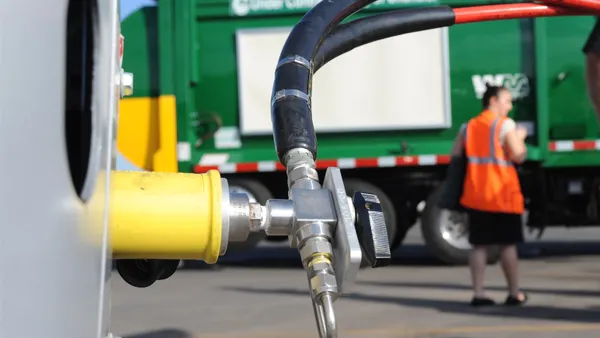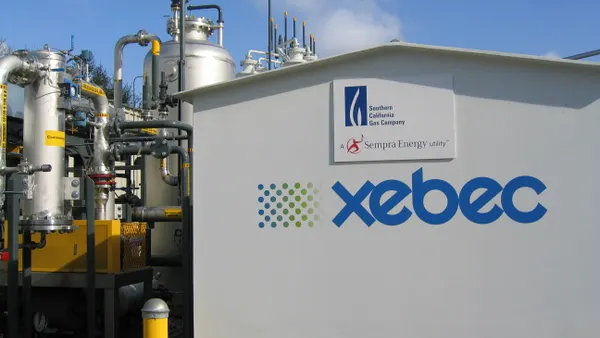Dive Brief:
- The Connecticut legislature is considering a bill that would require gas companies to ensure at least 5% of their output or services be from renewable natural gas (RNG) by 2033. The bill would create a renewable portfolio standard and establish a procurement process for RNG, direct the Public Utilities Regulatory Authority to establish quality standards for RNG, and require electric distribution companies to acquire electricity from a biomass facility.
- The legislation comes after a report from The Gas Technology Institute and Quantum Biopower revealed Connecticut has potential capacity for 41 MW of electricity from RNG and could displace 540,000 tons of carbon dioxide. Biomass, as defined in the bill, includes landfill gas and anaerobic digestion.
- The report highlights findings from a 2015 waste characterization study that show food waste makes up 22.3% of MSW in the state with "other organics" making up an additional 11%. The report estimates livestock waste from chicken and cows generated in the state has the potential to generate over two million cubic feet of biogas, accounting for about 10 MW of the total biogas potential.
Dive Insight:
Connecticut has a diversion goal of 60% by 2024. While the state already has a commercial organics mandate, a bill like the one being considered that forces electric distributors to use electricity from biogas could increase the demand for food waste and other biogas feedstock.
Building new facilities can be expensive, as evidenced from, among other things, New York City's processing capacity list naming sites around the Northeast. Separately from this bill, Connecticut may already be looking to expand its organics and AD capacity, as the redevelopment plans for a Hartford waste facility call for 40% of incoming waste to be recycled, through AD or other technologies.
While the debate is ongoing about whether WTE is a truly environmentally friendly way to use waste, there is a wider agreement that capturing methane, whether from landfills or from digesters, is a valuable way to use solid waste. The report highlights a handful of existing RNG injection projects around the country, including injection sites at the Point Loma Wastewater Treatment Facility in San Diego and an AD site in Stephenville, TX.
These projects are traditionally boosted by the Renewable Fuel Standard (RFS), which requires a certain amount of biofuel — from sources such as corn, landfill gas and digesters — each year.
However, while President Trump has reinforced his commitment to the RFS, there is an ongoing battle over its future, giving the program an uncertain future that could make investment in biogas programs less attractive.
The Connecticut General Assembly Energy and Technology Committee is scheduled to have a public hearing that includes discussion of the bill at 1 p.m. Tuesday.









